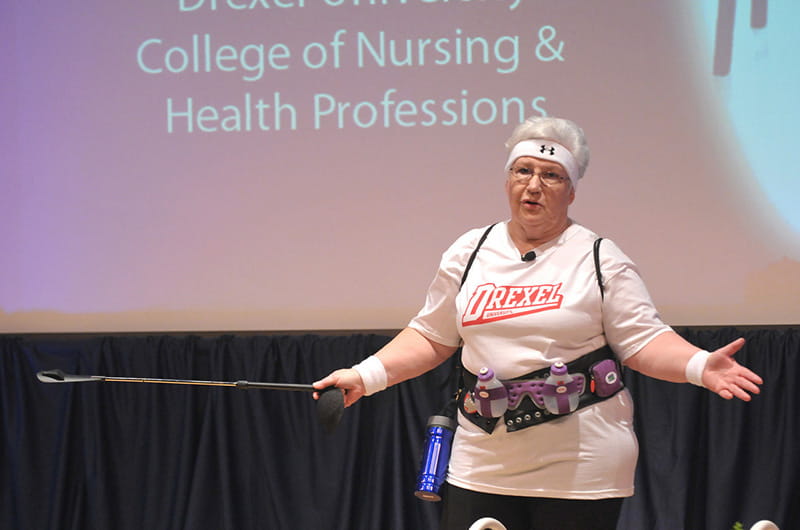Dean and Comedian? Gloria Donnelly Infuses Humor Into Her Job

If you ever get a chance to take a class with Gloria Donnelly, PhD, dean and professor in the College of Nursing and Health Professions, or sit next to her in a meeting, you should take it. Your anxiety levels, ability to learn and critique, and even your health might be better for it.
Donnelly believes in injecting humor in all aspects of her life, which means she’s usually the one cracking a joke during a difficult meeting or using a funny vignette or scenario while teaching.
“I will often use humor just to keep a lecture moving because there’s nothing more deadly than having to listen to someone drone on or read from something for an hour,” she said.
For Donnelly, it’s an approach she tries to follow whether she’s doing the talking or the listening.
“It’s tricky when you’re an administrator at a university and you see the humor in things, because lots of people at universities take themselves very seriously. But I think universities are very funny places because we often don’t step back and think about the things we do, some of the processes we invent and whether or not that would make any sense to the outside world,” she said. “We need, I think, a little more ivory tower comedy.”
So far, Donnelly has shown off her gentle, self-deprecating comedy at Drexel at a 2-hour-long standup event she hosted in 2010 that raised over $64,000 for students who couldn’t afford books.
“I talked about how I spent $3,000 on a personal trainer and I lost only 3 pounds, which is actually true! That’s funny because if you’re going spend that much money on weight loss or on trying to get healthier, you would expect a better effect. Combining incongruous concepts with one another is great for comedy — like a dean being a comedian,” she said.
Her teaching style reflects this as well, whether she’s lecturing around the country in front of an audience or teaching an online course. She prefers to inject comedy because people will remember more if you can elicit an affective response from them.
“I designed the first online course in the doctorate of nursing practice with another faculty member, and we picked vignettes and videos that were a little lighter than one would normally expect in a course called ‘The Development of Scientific Knowledge in Nursing,’” she said. “I always try to poke a little fun at theory and theorists in order to relax the students so they can be more critical.”
Humor can also be useful in simulation labs, though in a very different way. The College’s Center for Interdisciplinary Clinical Simulation and Practice offers multidisciplinary clinical simulation training that let students interact with real actors. The students are put in a clinical situation and have to act accordingly, and Donnelly thinks their reactions could be studied to show how they’re learning and thinking.
“I think improv really sharpens you as a thinker, and I was encouraging a faculty member recently about possibly increasing students’ critical thinking by injecting improv scenarios into clinical simulations,” she said.
Humor can also help with clinical situations in real life. Donnelly has seen firsthand how patients in hospitals who use their great senses of humor to help them heal more effectively. She likes to use the example of Norman Cousins, a famous writer and world peace activist who credited Groucho Marx movies in helping him battle a lifelong illness.
“There’s a lot about humor and healing in the clinical literature. I edit a journal, Holistic Nursing Practice, and we sometimes have articles about humor and I sometimes write about the power of humor in my editorials,” she said.
And above all, Donnelly believes that learning should be fun.
“Former President Constantine Papadakis used to say we had to think more about ‘edu-tainment,’ or content that can educate and entertain. I think that’s a good word because, let’s face it, in the world we live in, everyone’s hooked to their device. Someone standing in front of a classroom droning on doesn’t cut it anymore because we know attention spans have shortened in this social media generation. Twitter, for example, is 140 characters, so you have to keep it short and snappy,” she said.
Donnelly, who loves comedians like the self-righteous and angry Lewis Black and the self-effacing Richard Pryor, credits growing up with a humorous family in South Philly for giving her a humorous outlook on life.
“I can remember sitting with my father and watching Jackie Gleason. He would absolutely convulse with laughter. I grew up in a home where there was always a lot of laughter and as a developmental psychologist, I know that what you experience as a child over and over again gets programmed in and has a lot to do with how you develop,” she said.
She’s still developing her comedy, not professionally, but through watching standup specials and shows like “Last Comic Standing,” and seeing comedians like Black perform in person.
“Maybe in my next career I’ll do standup or improv. Who knows what gigs lie ahead?” she joked.
In This Article
Drexel News is produced by
University Marketing and Communications.

